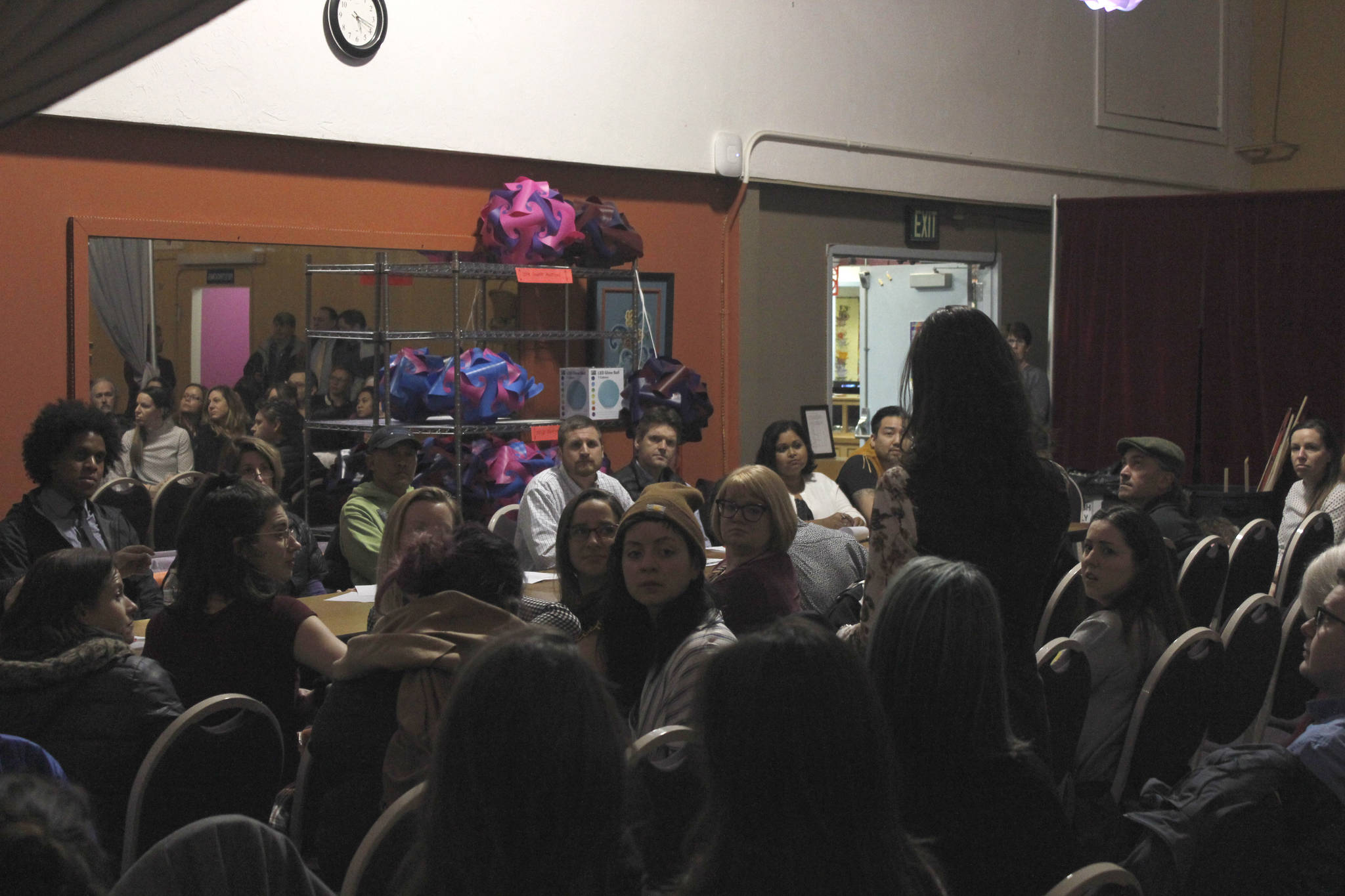The Juneau Arts and Humanities Council Board issued an apology Thursday afternoon to all involved in the fallout from running a piece that some found offensive in this past weekend’s Wearable Arts Show. The statement came after more than 100 people showed up at the body’s regular board meeting Wednesday night.
The piece, entitled “Doragon” by Haines artist Beth Bolander, included a large dragon design, kimono-style fabric and face paint in the style of a geisha. The piece drew criticism, as some asserted that it was an example of cultural appropriation — commonly defined as the act of adopting certain elements of another culture without the consent of those who belong to that culture. Neither Bolander nor her model are of Asian descent.
[Exploring the gray area between cultural appreciation and appropriation in Juneau]
Following the backlash of the Saturday showing, Bolander and the JAHC organizers agreed to pull the piece from the Sunday show. The JAHC board released a lengthy statement Thursday, apologizing to people of color and others who were offended by the piece, as well as Bolander, the model Dani Gross, Bolander’s friends and family, the artists at the event and to those who spoke out about the issue.
“The JAHC is receiving a high degree of criticism from both sides of this debate, and truthfully it is deserved,” the statement read. “By allowing escalation to the degree it reached, our organization let the entire community down.”
JAHC Board President Eric Scott said by email Thursday afternoon that the board members believe the correct decision was to not run the piece on Sunday, but would not comment on whether the board members felt the piece should have been run in the first place. He referred back to the board’s official statement.
“It should have been identified and addressed sooner,” the statement read. “It was not. That the piece was still judged and awarded was yet one more error made.”
[Read the full statement here]
The statement also read that the JAHC will hold regular meetings where community leaders come and speak about the topic of appropriation. There will also be policies and educational materials put in place for next year’s Wearable Art Show, the statement says. There will be equity training for staff and board members as well, the statement read, which was already in the works.
Issues of art and privilege
At Wednesday’s board meeting, held at the Juneau Arts and Culture Center (JACC), more than 20 people spoke during the public comment period. All of them spoke about the issue of cultural appropriation, and all who spoke were of the opinion that the piece was offensive.
Freda Westman of the Alaska Native Sisterhood (ANS), said she designed a piece in the show and expressed her concerns about Doragon to the JAHC board during rehearsals leading up to the show. The piece ran anyway, and ended up winning third place according to a panel of jurors.
“By awarding third place, the actions of the 2018 Wearable Art Show support, condone and promote cultural appropriation and racism,” Westman said. “I also want to say that by describing why the piece was pulled for concern for the model and the artist was racial micro-aggression, false and a red herring to misdirect our attention from the mishandling of this situation.”
Much of the discussion stayed away from the individual piece, instead addressing the larger issues of oppression and borrowing cultural elements without permission.
David Russell-Jensen spoke about the role that privilege plays in art. While art is meant to push boundaries and challenge people, those boundaries are often set by people with privilege, Russell-Jensen said.
“Cultural appropriation is especially harmful because whereas costumes can be taken off for privileged people, marginalized people cannot put privilege back on at the end of the night,” Russell-Jensen said. “Yellowface washes off, blackface washes off, redface washes off, but the actual marginalized people cannot assume faces of privilege the next day.”
Many of the speakers addressed the importance of listening as well as speaking out. The main places for discourse on this topic so far have been comment sections and Facebook threads, as many in attendance Wednesday pointed out. Many of them talked about how these divisive, volatile exchanges have only made the situation worse.
Marian Call, a local singer and songwriter, was the final member of the public to speak and said she was moved by the words of those who had spoken before her. Though artist seldom attempt to cause harm, they can still do so if they don’t understand the history of appropriation and the damage that perpetuating stereotypes can do.
“We all have to leave this room and go back to being a community while bumping into each other and bumping into some people who have just said some really mean stuff on Facebook,” Call said. “We’ve got to figure out how to do that, and I recommend that we start by remembering that individuals and community can all be trying their best to do the right thing at the same time and still hurt each other, because of this history of oppression.”
• Contact reporter Alex McCarthy at 523-2271 or amccarthy@juneauempire.com. Follow him on Twitter at @akmccarthy.

